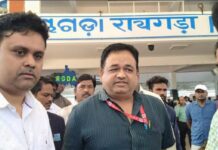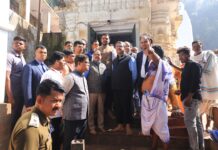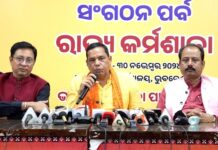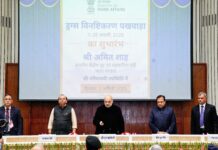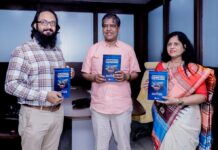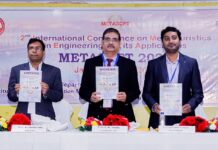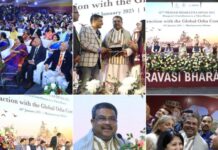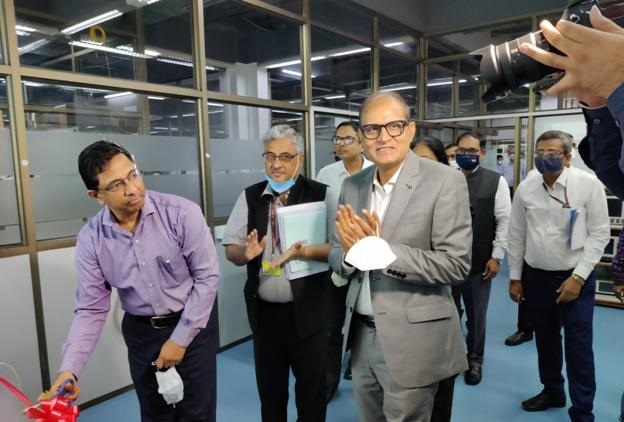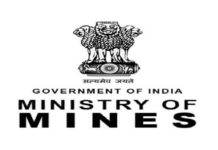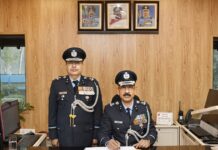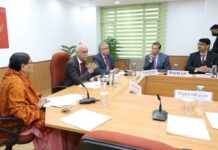By Our Correspondent
NEW DELHI/BHUBANESWAR: K. Rajaraman, Secretary (T) and Chairman – Digital Communications Commission, Department of Telecommunications, Government of India, visited Centre for Development of Telematics (C-DOT ) Delhi Campus yesterday. C-DOT is the the premier Telecom R&D centre of the Department of Telecommunications, Ministry of Communications, Government of India. He interacted with senior officials of C-DOT and reviewed the R&D projects being developed by CDOT. He was given a detailed presentation about the telecom R & D activities undertaken by C-DOT by Dr. Rajkumar Upadhyay, Executive Director, C-DOT. Subsequently he visited various C-DOT labs including labs of 4G/5G, GPON, Encryptors, Routers, WiFi, Cyber Security etc. He encouraged the researchers working in various R&D projects and later addressed C-DOT officers. Officers from CDOT Bangalore campus joined the address through video conferencing tool developed in-house by C-DOT.
Shri Rajaraman asked C-DOT engineers to work with full dedication towards realizing the goal of “Atmanirbhar Bharat” in field of telecom. He also appreciated the contribution of C-DOT in achieving self -reliance in the field of telecom and assured full support of DoT in all endeavors of C-DOT. He complimented C-DOT for its critical role in developing indigenous 4G technology and ongoing 5G development project. (4G technology from CDOT is already under Proof of Concept (POC) Trial in BSNL network at Chandigarh and Ambala). He stressed upon CDOT to keep track of emerging technologies, align with the technology life cycle and asked CDOT to start working on 6G and other futuristic technologies in order to catch up with the market in time. He also advised C-DOT to focus on commercialization of technology and consider setting up incubators in C-DOT for faster technology commercialization. C-DOT was also asked to focus on contributing in national as well as international standards as well as creating more IPR.
Sh. K. Rajaraman also inaugurated the Quantum Communication Lab at C-DOT, Delhi and unveiled the indigenously developed Quantum Key Distribution (QKD) solution by C-DOT which can support a distance of more than 100 kilometers on standard optical fiber. Development of indigenous QKD solution is essential to address the threat that rapid advancement in Quantum Computing poses to the security of the data being transported by various critical sectors through the current communication networks. With the development of QKD solution and the existing suite of wide range of products in Optical Access, Core, Switching & Routing, Wireless, Post Quantum Cryptography Encryptors (PQCE) etc, C-DOT has become the first organization in India to offer complete portfolio of indigenous Quantum Secure telecom products & solutions to comprehensively address the requirements of Telecom Service Providers as well as Strategic and Defense sector in India.
A brief about Quantum Technologies and QKD:
Quantum Technologies are one of the most researched area at present and are attracting huge investments by Governments all across the globe as well as by private players ranging from multinational giants to start ups. Almost all countries have dedicated programs for furthering research in this area, which has immense potential, impact of which can probably be compared with that of semiconductor technology in the last few decades or the impact that the laser had since its invention in 1960s.
Quantum Technologies can broadly be divided into four verticals viz. Quantum Computing, Quantum Communications, Quantum Sensors and Quantum Materials. To comprehensively address all these verticals and leapfrog India in this crucial & niche area, India has launched National Mission on Quantum Technologies & Applications (NM-QTA). This was announced by Hon’ble Finance Minister in her budget speech delivered in February 2020. This initiative, with a budget of more than USD 1 Billion spanning over eight years, will be led by Department of Science and Technology (DST) and will have active participation from various other ministries e.g. Department of Telecommunications, Department of Space, Department of Atomic Energy etc.
Quantum Technologies are based upon phenomena exhibited by microscopic particles (like photons, electrons, atoms etc.) which are quite distinct from the way normal macroscopic objects behave. Behavior of these microscopic particles can’t be described by Classical (or Conventional) Physics based on Newtonian Mechanics, and consequently Quantum Mechanics came into picture, around 100 years back, to formulate theory to describe such behavior. One of the most quoted such phenomena is the “Photoelectric effect” for which Einstein was awarded the Noble Prize in Physics in the Year 1921. Quantum Mechanics is probabilistic in contrast to Classical Mechanics which is deterministic. Besides this, Quantum Mechanics is counterintuitive as the phenomena of Superposition, Entanglement, Teleportation & Tunneling etc. exhibited by microscopic particles appears weird and have no equivalence in everyday life. These aspects of Quantum Mechanics have, however, led to number of interesting applications such as exponential increase in computing power, inherently secure communication (teleportation of information), interaction free measurements, extremely precise & sensitive sensors etc.
Centre for Development of Telematics (C-DOT), a premier telecom research & development organization under Department of Telecommunications, Government of India, is leading the effort in the Quantum Communications vertical of NM-QTA. C-DOT has developed Product in one of the most promising applications of Quantum Communications viz. Quantum Key Distribution (QKD) and is continuing to pursue research in this area. Development of QKD solution will address the threat that rapid advancement in Quantum Computing poses to the security of the data being transported by the current communication infrastructure.
C-DOT is actively looking to collaborate with other national & international institutes and organizations working in the area of Quantum Communications to synergize efforts in this nascent field.


